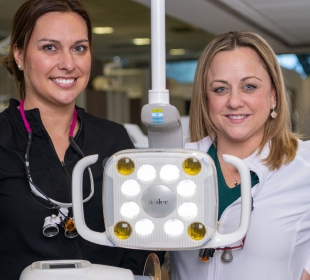Elevating the Art of Dentistry: Western’s Expanded Functions Program
Western’s Expanded Functions Dental Auxiliary program is reshaping dental care in Wisconsin, empowering alumni like MacKenze Ramsey and educators like Nicole Schmit to redefine what’s possible in the field.

For MacKenze, a 2016 Western alum, the program felt like a natural next step. After completing the Dental Assistant program, she secured a job at Rivertown Dental before graduating, thriving in its collaborative, learning-focused culture. “I’ve always loved my job, but this program opens up new possibilities,” she says, explaining how it allows dental assistants to handle reversible procedures like placing and adjusting fillings, making night guards, and removing sutures. “It’s about freeing up hygienists and dentists so we can all focus on what we do best.”
Nicole, who helped implement the program at Western, was eager to bring expanded functions training to students. “Expanded functions were just coming down the pipeline when I started here,” she recalls. “Once the legislation was finalized, we worked with WTCS (Wisconsin Technical College System) and other colleges to build the curriculum. By September, we had our first cohort ready to go.”
The program’s eight-week, weekend-based structure allows students like MacKenze to continue working while advancing their skills. “The weekend classes let me keep working while learning new skills,” she says. “Nicole and the team made sure everything was organized and practical, so we could apply what we learned immediately.” Running the program under Western’s Business and Industry Services also ensures flexibility. “It’s a material-intensive program,” Nicole explains, “but this approach lets us reinvest fees into supplies and run the program whenever a class fills.”
Dental assistants or hygienists can qualify in multiple ways: either by completing 1,000 hours of practice and holding a Certified Dental Assistant (CDA) credential, or by having 2,000 hours of experience verified by a supervising dentist and passing Prior Learning Assessment (PLA) exams. Those who don’t pass can take additional online courses. “It’s about meeting students where they are,” Nicole says. “Whether they’re just starting or have years of experience, we want to provide opportunities for advancement.”
Beyond career growth, the program is making an impact in the community. MacKenze highlights its role in initiatives like Give Kids a Smile Day, where expanded functions assistants can provide additional patient care. “It’s amazing to see how much more we can do for patients,” she says. Facility renovations at Western’s Health Science Center are also enhancing training opportunities. “We’re getting cutting-edge technology like 3D printers and a CBCT machine,” Nicole shares. “These resources are game changers for dental education and patient care.”
For MacKenze, the journey to expanded functions wasn’t linear. She initially struggled in a business program and left college before returning to Western with a renewed focus. With the support of advisors, scholarships, and Rivertown Dental, she found her passion in dental assisting. “If we all do something little, it doesn’t have to be a heavy lift,” she says, reflecting on her decision to help set up scholarships for Western students.
Nicole sees the program’s growing impact. “This is just the beginning,” she says. “We’re already seeing the effect on patient care and efficiency. With our renovated facilities and talented students, the possibilities are endless.”
Western’s Expanded Functions Dental Auxiliary program is more than a training opportunity—it’s a model for innovation, collaboration, and community impact, setting a new standard for dental education in Wisconsin.
